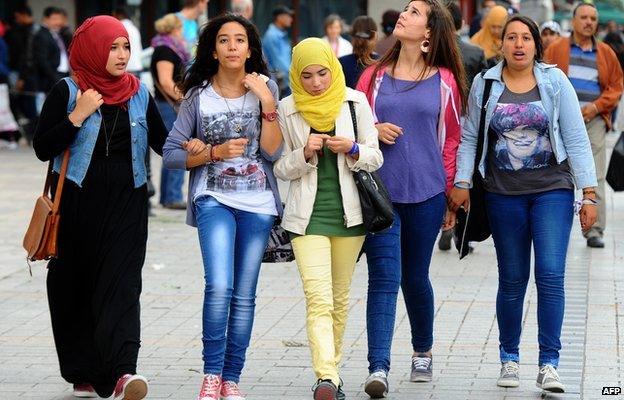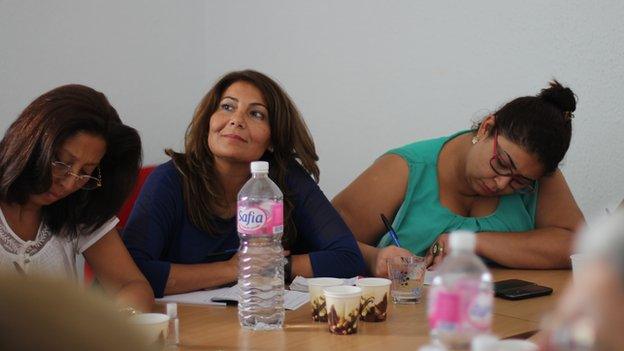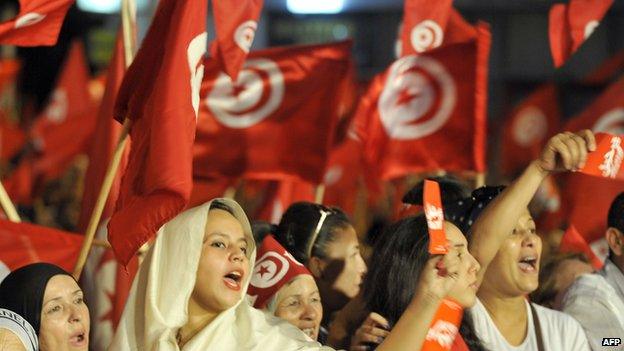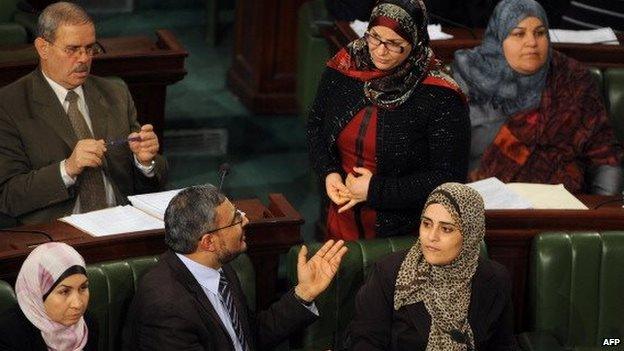Tunisian women take a 'step backwards'
- Published

Sitting before a big screen with a list of key bullet points, women are busy taking notes about how to become Tunisia's next political leaders.
"Women in Tunisia have the required self-confidence to become decision makers but what they lack are some leadership skills," says the coach leading the non-governmental organisation workshop in the capital, Tunis, teaching them how to organise an electoral campaign.
At a time when many women in the Arab world are fighting hard to promote their political rights, Tunisian women have them explicitly entrenched in their laws.
The new constitution adopted at the beginning of this year calls for the state to strive to achieve parity between men and women in all elected bodies.
But as Tunisians prepare to go to the polls next month, female candidates have been finding that words alone are not enough.
"Laws are very important," argues Lobna Jeribi, an MP from the centre-left party Ettakatol.
"They forced political parties to reach out to women and engage them more actively."
The electoral law she is referring to states that electoral lists for all 33 constituencies must have an equal number of male and female candidates.
It is a law that positively discriminates in favour of women, but it does not automatically mean that an equal number of women and men will be elected to parliament.

The women at the workshop are taught to use their self-confidence in the political arena
This is because Tunisia has adopted a proportional electoral system, which means the position of each candidate on a list is key in determining his or her chances of getting elected.
Those on top of the constituency lists have the strongest chance.
In the coming elections, only 11.2% of the lists are headed by female candidates.
"It's somehow a step backwards," concedes Ms Jeribi.
She could not get her own party to select more than five women at the top of its lists.
"Even the most progressive parties faced real difficulties in recruiting and engaging women," she says.
"To have a woman on top of the list is not just for the sake of having a woman.
"She has to be a leader in her constituency and therefore likely to be elected."
This assessment echoes with the observations of Meherzia Labidi, the deputy speaker of parliament, one of just three women heading electoral lists for the Ennahda Islamist party.
"I'm disappointed," admits Ms Labidi.
"I really wished that my party and other parties were more audacious in offering more seats for women to become leaders."
But she can hardly hide her smile as she continues: "We've still scored better than other parties portrayed by the media as modernists and secular."
She was particularly referring to Nidaa Tounes, a party believed to be the strongest rival to Ennahda.
It has put forward only one woman to head an electoral list.
"The conventional way of depicting the political scene in Tunisia as if, on one hand, there are Islamists who are conservative and excluding women and threatening their rights, and on the other, modernists who value the contribution of women and advance their rights, was utterly shaken," she says.

Women have a long history of activism in Tunisia - as these protesters against Ennahda show last year

Ennahda's female MPs feel they played an important role in the heated debates over the new constitution
Every party, she believes, is facing the same issues with regard to the greater role for women.
But Ms Labidi takes pride in detailing the role that Ennahda's female MPs played in the constituent assembly that approved the new constitution after three years of heated debates.
'Big change'
During that period, one recurrent topic was the preservation of women's rights.
"Our experience in parliament was an opportunity for us - female MPs from Ennahda - to be visible as political leaders," she says.
"There is a big change in mentalities and convictions now.
"The difference has not been between the Islamists and modernists but the real change came from the fact that it was proven that women can play a real role in the political life."

Tunisia's transition timeline
January 2011 - long-serving ruler Zine al-Abidine Ben Ali ousted
October 2011 - assembly elected to draw up a new constitution
January 2014 - new constitution passed
26 October 2014 - parliamentary elections scheduled
23 November 2014 - presidential elections scheduled (with a second round in December if necessary)

What recent experience seems to have shown both Ms Labidi and Ms Jeribi is that the political advance of women will be a long process.
They both agree that it requires more effort from the political parties themselves - this is where the real reform must start.
They want political movements to become more inclusive towards women and to reach out to female members within their ranks and engage them in a stronger way.
"This will groom women to take up political responsibilities and prepare them to become leaders and prominent figures in their constituencies," says Ms Jeribi.
According to Ms Labidi, once this is established "Tunisia will not only be the country in which women have a better status, but the country in which women have a more efficient role in politics".
Women in Tunisia have always been pioneers in the civil society; they also outnumber men in many key public positions.
The challenge for them now is to establish a stronger party presence in order to have a bigger clout in politics.